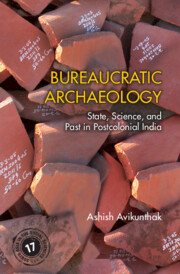Book contents
- Frontmatter
- Dedication
- Contents
- List of Figures
- Preface
- Acknowledgments
- Note on Transliteration
- List of Abbreviations
- 1 Anthropology of Archaeology
- 2 The Making of the Indus–Saraswati Civilization
- 3 Bureaucratic Hierarchy in the ASI
- 4 Spatial Formation of the Archaeological Field
- 5 Epistemological Formation of the Archaeological Site
- 6 Theory of Archaeological Excavation
- 7 Making of the Archaeological Artifact
- 8 Performance of Archaeological Representations
- 9 The Absent Excavation Reports
- Conclusion
- Bibliography
- Index
9 - The Absent Excavation Reports
Published online by Cambridge University Press: 20 August 2021
- Frontmatter
- Dedication
- Contents
- List of Figures
- Preface
- Acknowledgments
- Note on Transliteration
- List of Abbreviations
- 1 Anthropology of Archaeology
- 2 The Making of the Indus–Saraswati Civilization
- 3 Bureaucratic Hierarchy in the ASI
- 4 Spatial Formation of the Archaeological Field
- 5 Epistemological Formation of the Archaeological Site
- 6 Theory of Archaeological Excavation
- 7 Making of the Archaeological Artifact
- 8 Performance of Archaeological Representations
- 9 The Absent Excavation Reports
- Conclusion
- Bibliography
- Index
Summary
It was in the dry winter of 2003 at Dholavira when I met ASI archaeologists and technical staff who had excavated the disputed site of the Ram Janmabhoomi– Babri Masjid complex in Ayodhya. Speaking about the Ayodhya excavation was prohibited. It was not a mere taboo, but illegal. Everyone who had worked at Ayodhya had signed a High Court prohibitory order—it was forbidden to divulge any details about the excavation. A draughtsman—a 15 years’ veteran of the ASI—in hushed tones rebuked me: “Why are you troubling [taqleef] me? I have to support my children, sir [bibi-bache hai, saheb]. The court has forbidden [mana hai] us to talk about the excavation. It is too sensitive [English word used].” It was less than four months after the Ayodhya excavation and trepid reluctance was in the air. Most of my informants were frightened to speak, but some whose confidence I had gained did communicate. For the next two years, as I conducted my fieldwork, I had a series of conversations with some members of the Ayodhya excavation whom I met during my fieldwork at ASI sites. All of them refused my request for a formal interview. But in the slow and languorous pace of an ASI archaeological excavation, time is not at a premium; gradually my informants opened up and candidly shared their experiences at the Ayodhya excavations of 2003.
“This was the most terrifying archaeological excavation in the history of the ASI. Full of tension [English phrase used],” he continued. On nudging further, he explained:
Now what should I tell you? [Ab kya bathae aapko?] First, no one digs in the summer. Second, this is archaeology and not red tape [babugiri]. We dig history [itihas]. We make history. We make the nation [rashtra]. And we need time [waqt]. Archaeology is about patience. Archaeology is a science. Archaeology is an art. You cannot do archaeology under the pressure. But who will tell the High Court? They gave us the order and we did the work [Unhone order diya. Aur hamne kaam kiya]. After all we are government servant[s] [sarkari naukar hai]. If the court tells us to dig on the moon, we will have to do it.
- Type
- Chapter
- Information
- Bureaucratic ArchaeologyState, Science, and Past in Postcolonial India, pp. 227 - 258Publisher: Cambridge University PressPrint publication year: 2021

